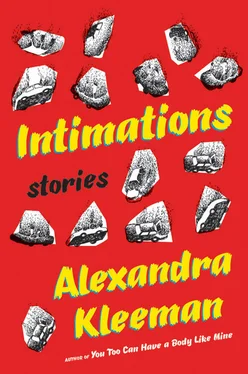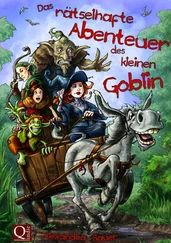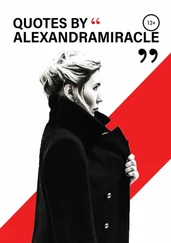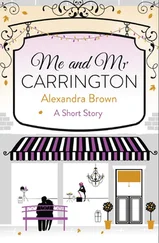Dressed in lavender stripes, the baby looked up at her calmly and shut her mouth. By six months, infants were supposed to babble freely — but hers had said almost nothing. A traumatic or hostile home environment could obstruct an infant’s development, but Karen was confident that she and her husband weren’t guilty of that. They got along well, and when they fought it was in the style that he preferred — sentences clipped, reasonable but with a harsh and colorless tone. There was nothing there that could harm a baby, Karen told herself, especially one that didn’t even understand words. Karen and her husband had met when they were young and working in a bigger city. One of the best things about him had been his face, which was handsome but not overly so. It was a healthy, normal face, and when you looked at it you could imagine the person it belonged to doing any number of harmless things — pedaling on a stationary bicycle, assembling a sandwich, listening to music while driving a car. Just looking at that face was enough to make Karen feel that she had peered into every crevice of his personality. But when he was away for too long, she found it difficult to remember how the different parts of his face fit together, even though they had been married for almost five years now.
Outside the window, men walked past berating faceless, bodiless voices on their phones. Cars rolled by so slowly that she could hear the engine whine in the deep center of the machine. It was time to begin speaking to your baby, the parenting books warned. At all moments of the day she should be describing the world and linking objects with the words that identified them. Without a steady stream of well-articulated adult speech an infant might lag in its development, not only in language use but also in its understanding of objects, concepts, and reasoning. Her daughter would essentially remain an animal. Karen wanted to begin speaking a steady stream of well-articulated language to her baby, but it was difficult to articulate. Sometimes when she sat still and listened to the inside of her mind she became distracted by the sound of a gentle rushing, like water from a faucet.
From the neighboring apartment came a noisy coughing, muffled by the wall between. The cougher was an unlikable retiree who the neighbors referred to by his last name, Puldron. Each day she watched through the sighthole in her door as he shuffled over to her stack of mail on the entryway table to paw piece by piece through her bills and catalogs, his blunt fingers pinching and creasing the flimsy photos of stylish outdoor furniture. Sometimes she heard the sound of a page being ripped out and folded over and over into a tight packet, and when she cross-referenced her mutilated catalog with the one on view online, she saw that hers was now missing an image of a picnic basket or an industrial-style upholstered coffee table with wheels. Was Puldron trying to keep her from buying those objects and putting them in her home to make her family complete?
The coughing continued, louder and more urgent. It grew and solidified simultaneously, like a skyscraper seen from an approaching car. Again and again Puldron emptied his throat of sound, and Karen could hear the wet clutch of the throat tube. A muscular gk shuddered at the edge of the sound, the snag of choking. He hacked at the thing trapped in him until she found herself standing up, still holding her baby, her body moving to do something it hadn’t decided on yet: she had never spoken to Puldron, had never wanted to, maybe he’d take it as some sort of aggression. She looked down at the small ears of her daughter, unavoidably open to the world, eagerly capturing the sounds of the choking man and turning them inward to shape her soft, growing mind.
Karen waited. The coughing turned to a wheeze, culminated in silence.
She went over to the wall and pushed her ear to it. Nothing stirred behind the white wall, no spasm of mouth or throat. It had only been a minute or two, or maybe a couple more, since the choking had started. She bumped her elbow weakly against the wall, arms full of daughter. “Are you choking?” she shouted.
If it was true that the smallest unit of stimuli could have a formative effect, then listening to the death of her neighbor only a few feet away in his apartment was bound to do horrible things to future Lila. There could be pyromania, cutting of the skin, morbid fascination with death. Teenage perils that Karen could hardly believe she had experienced herself, in her own past — thinking about it was like hearing a funny story about something you had done while you were drunk, an event you had to trust had been real but which now no longer lived even in your own mind. The worst part was, she had already let it happen: Lila had heard the whole grisly sound track. Karen needed to show her something beautiful immediately — a swan, a fountain. She propped the baby on the sofa and went around the apartment grabbing things and throwing them in an oversize, floppy bag. She put the bag on the stroller, buckled the little body into the seat, breathing in spurts. At the door she realized that she should have called an ambulance. She took the phone from her pocket. It was too late, wasn’t it?
Karen pulled the door open to escape and found Puldron, alive, standing by the mail table. Her reaction was relief, then irritation. The damage to Lila’s psyche had already been done.
Puldron exhaled wetly and continued his work as she pushed by him. He didn’t move; there was plenty of room for the frantic woman to get by with her ugly stroller. He flipped the page, flipped the page again, until he found something workable. With small fine movements he tugged at the paper, tearing along the crease buried in the booklet’s stapled spine. It was a picture of a complicated bowl, asymmetrical and made of iron: an object with gravity. The bowl had a vaguely birdlike shape, like it could glide from on high. At the same time, it was large and surely very heavy. In the trough of the bowl, some idiot had placed a couple of puny lemons, shattering the remarkable somberness of the piece. The salespeople behind these photos wanted to make you believe you could live a happy homemaker’s life with these objects, but in fact the best thing an object could do was to remove you from your life, offer you a portal into the world of pure form. When handling a truly well-balanced piece, you could feel its proportions in your body, in the rightness of your hands traveling its surface. But it was no use speaking of pure form with the people you came across. This was an age in which everything in the world emerged from the womb with a price already stamped upon it.
While there was nothing exactly wrong with the park, there was not much right with it either. The light-colored grass was brittle to the touch and though it looked like it needed water, between bristly tufts the earth was soft and muddy. To her right and left loose bands of teenage boys and girls shoved one another, the girls letting out terrifying screams and then laughing at Karen when she turned to look at them. “That lady’s never seen someone have fun in her entire life,” one girl said to another. “She’s like, I’m scared!” the other girl replied. As she shoved the ugly red stroller over the chalky path Karen wondered what type of body language she was projecting to the surrounding world. When she had left the hospital with Lila in her arms it seemed as though she had stepped onto a different planet. People looked at her now only to get out of her way. If someone stopped to speak to her, linger on her, it was always a woman — a woman with advice on how to mother, a woman who wanted to know the baby’s name or age. She had emerged into a world made only of women, and although they used a friendly tone they spoke to her like a new employee whose incompetence was guaranteed.
Читать дальше












